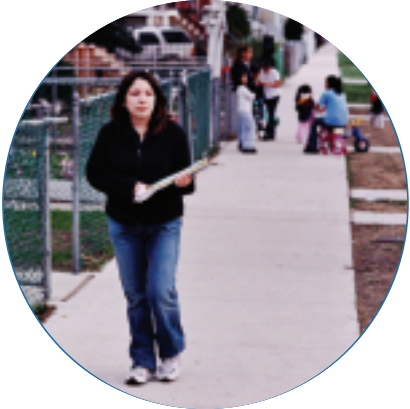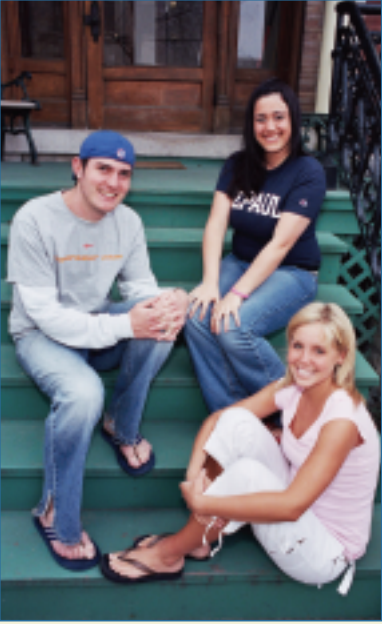
Cristina Salgado, a senior majoring
in psychology at DePaul, vividly
remembers the Perspectives on
Community Service class she took
last fall. She says that students were
discussing this country’s system of
government and many were
complaining about it. That is when
Howard Rosing, who teaches the
class, challenged the students. “He
asked us, ‘Who is going to live to
make the change that we think is
needed?’” Salgado says. “I realized
that I want to be one of those
people. I have a passion for working
for social justice and peace, and I’ve
had the chance to do something
about it through classes and
internships at school.”
Salgado is among a
growing number
of students who
have chosen to
make Community Service Studies their
academic minor. In doing so, she has learned
about community service through a range
of required and elective classes and by
working as an intern. She currently interns
for the Albany Park Neighborhood Council
on Chicago’s northwest side, where her
responsibilities include working with staff to help
immigrants who are already U.S. residents to
become citizens.
Genesis of the program
The Community Service Studies minor was developed in the late
1990s as part of a University-wide effort to extend opportunities for
learning through practice into multiple curricula at DePaul. For
years, students have been fulfilling a requirement for experiential
learning through a variety of options like taking a service learning
course, doing an internship, or studying abroad. Some students
even crafted their own path to community service through individual courses.

Until the Community Service Studies minor was
established, though, students typically had to do all the footwork
themselves, says Alexandra Murphy, Director of Community Service
Studies and Associate Professor of Communication. Now there is an
infrastructure for students who want to pursue the Community
Service Studies minor. “Our goal is to connect students to the
mission of service by offering a range of classes focused on
community service including internships with non-profit
organizations,” Murphy says. “For students that have an interest in
looking at issues of social justice and social change, here is a
structured program that offers these opportunities. We believe this
program can enhance students’ understanding of community issues
while also helping guide their career choices.”
“I have a passion for working for social justice and
peace, and I’ve had the chance to do something
about it through classes and internships at school.”
Laurie Worrall, Executive Director of the Steans Center,
says that the minor can introduce students to a
world they might not otherwise encounter – the
world of a non-profit organization working on a
pressing social issue. “When I talk to parents and
incoming students about the Community Service
Studies minor, I try to give them an idea of the
very rich and rewarding work being done in the
non-profit sector,” Worrall says. “It is vital to
American democracy and a vital aspect of our
economy.”
“Interdisciplinary” is one word DePaul faculty and staff
often use to describe the Community Service Studies
program. One look at the range of courses that the minor includes
suggests why. Many different departments have offered courses
that help fulfill requirements in the minor, including English,
Religious Studies, Women’s Studies, Latin American and Latino
Studies, and Anthropology. Though students are required to take
three foundation courses in the minor (Perspectives on Community
Service, Introduction to Non-Profit Management and Community
Internship), there is significant latitude in terms of electives.
 Professors who have taught classes in the minor say that
it creates a unique opportunity for students to build
academic and work-related skills while getting to know
non-profit organizations. Roger Graves, an English
professor who has taught grant writing to students in his
Writing and Social Engagement class, says that in effect,
the minor tells undergraduates that “there are all kinds of
jobs in non-profits – and the people who work for them
are often devoted to changing the way things are. I’m a
big supporter of the Community Service Studies minor.”
Rose Spalding, a political science professor who
specializes in Latin American Studies, taught a
class in which students worked with community
organizations on fair trade issues. “One of the wonderful
things about the Community Service Studies minor is that
often times when people are thinking about a career,
they are thinking of large organizations – how they will
fit, how it will reflect their goals and values. When you
work in community service, many of the organizations are
small. It’s empowering to see that a handful of people can
launch an effort that’s significant – and in which people
don’t have to compromise their values.”
Student experiences
The flexibility of the curriculum and its strong
commitment to experiential learning, in classrooms and
communities, are among the reasons why students choose
the minor. Colleen Napleton, one of the first students
who minored in Community Service Studies, also took the
Perspectives class, as well as a Community Internship class.
Napleton recalls volunteering through the program at
Trilogy, an organization in Chicago’s Rogers Park
community that provides services for adults who have
chronic mental illnesses.
Professors who have taught classes in the minor say that
it creates a unique opportunity for students to build
academic and work-related skills while getting to know
non-profit organizations. Roger Graves, an English
professor who has taught grant writing to students in his
Writing and Social Engagement class, says that in effect,
the minor tells undergraduates that “there are all kinds of
jobs in non-profits – and the people who work for them
are often devoted to changing the way things are. I’m a
big supporter of the Community Service Studies minor.”
Rose Spalding, a political science professor who
specializes in Latin American Studies, taught a
class in which students worked with community
organizations on fair trade issues. “One of the wonderful
things about the Community Service Studies minor is that
often times when people are thinking about a career,
they are thinking of large organizations – how they will
fit, how it will reflect their goals and values. When you
work in community service, many of the organizations are
small. It’s empowering to see that a handful of people can
launch an effort that’s significant – and in which people
don’t have to compromise their values.”
Student experiences
The flexibility of the curriculum and its strong
commitment to experiential learning, in classrooms and
communities, are among the reasons why students choose
the minor. Colleen Napleton, one of the first students
who minored in Community Service Studies, also took the
Perspectives class, as well as a Community Internship class.
Napleton recalls volunteering through the program at
Trilogy, an organization in Chicago’s Rogers Park
community that provides services for adults who have
chronic mental illnesses.
“I did a lot of community service work in high
school, and this experience gave me a broader
sense of  what was happening in a Chicago
community,” she says. “At one point, one of the
women learned how to handle her finances. To
see her progress was a really meaningful
experience. The classroom experience was also
interesting, especially since students were learning
different things in their own community work.”
Napleton, who graduated from DePaul with a
Psychology degree, is now in her second year of
graduate school at the Illinois School for
Professional Psychology. When asked what she
would tell students who are considering the
Community Service Studies minor, she says she
“would emphasize the intensity of the feelings of
helping people – giving part of yourself. On top of
that, Steans definitely gives you the help you need.
They can help you figure out what goes well with
your major or subjects you are interested in.”
Laura Garza, a major in Accounting who
completed the Community Service Studies minor in
the winter quarter, was working at the Steans
Center when she learned about the minor. “I took
a project-based class in which we built a database
for a non-profit organization,” she says. “Later, I
had the chance to teach financial management
classes at Prologue Alternative High School in
Chicago’s Uptown community. It was a really
challenging experience and exposed me to
communities I wouldn’t have been exposed to
otherwise.”
“I think the minor helped me focus on what I want
to do with my life,” Garza says. “Before, I was told
I have to go to college, have to find a career. This
minor gave me ownership over what I’m interested
in. Right now I am thinking of doing accounting
work in the corporate world for 3 to 5 years and
then working for a non-profit.”
For Cristina Salgado, minoring in Community
Service Studies is having a big impact on her life.
“The best way to learn is hands-on and that’s what
the minor gives you, hands-on experience working
with people and neighborhoods and being able to
bring that back to the classroom,” she says. “You
are not only learning about Chicago, but about
neighborhoods, social justice issues – and yourself.
And I think that’s what college is all about.”
what was happening in a Chicago
community,” she says. “At one point, one of the
women learned how to handle her finances. To
see her progress was a really meaningful
experience. The classroom experience was also
interesting, especially since students were learning
different things in their own community work.”
Napleton, who graduated from DePaul with a
Psychology degree, is now in her second year of
graduate school at the Illinois School for
Professional Psychology. When asked what she
would tell students who are considering the
Community Service Studies minor, she says she
“would emphasize the intensity of the feelings of
helping people – giving part of yourself. On top of
that, Steans definitely gives you the help you need.
They can help you figure out what goes well with
your major or subjects you are interested in.”
Laura Garza, a major in Accounting who
completed the Community Service Studies minor in
the winter quarter, was working at the Steans
Center when she learned about the minor. “I took
a project-based class in which we built a database
for a non-profit organization,” she says. “Later, I
had the chance to teach financial management
classes at Prologue Alternative High School in
Chicago’s Uptown community. It was a really
challenging experience and exposed me to
communities I wouldn’t have been exposed to
otherwise.”
“I think the minor helped me focus on what I want
to do with my life,” Garza says. “Before, I was told
I have to go to college, have to find a career. This
minor gave me ownership over what I’m interested
in. Right now I am thinking of doing accounting
work in the corporate world for 3 to 5 years and
then working for a non-profit.”
For Cristina Salgado, minoring in Community
Service Studies is having a big impact on her life.
“The best way to learn is hands-on and that’s what
the minor gives you, hands-on experience working
with people and neighborhoods and being able to
bring that back to the classroom,” she says. “You
are not only learning about Chicago, but about
neighborhoods, social justice issues – and yourself.
And I think that’s what college is all about.”